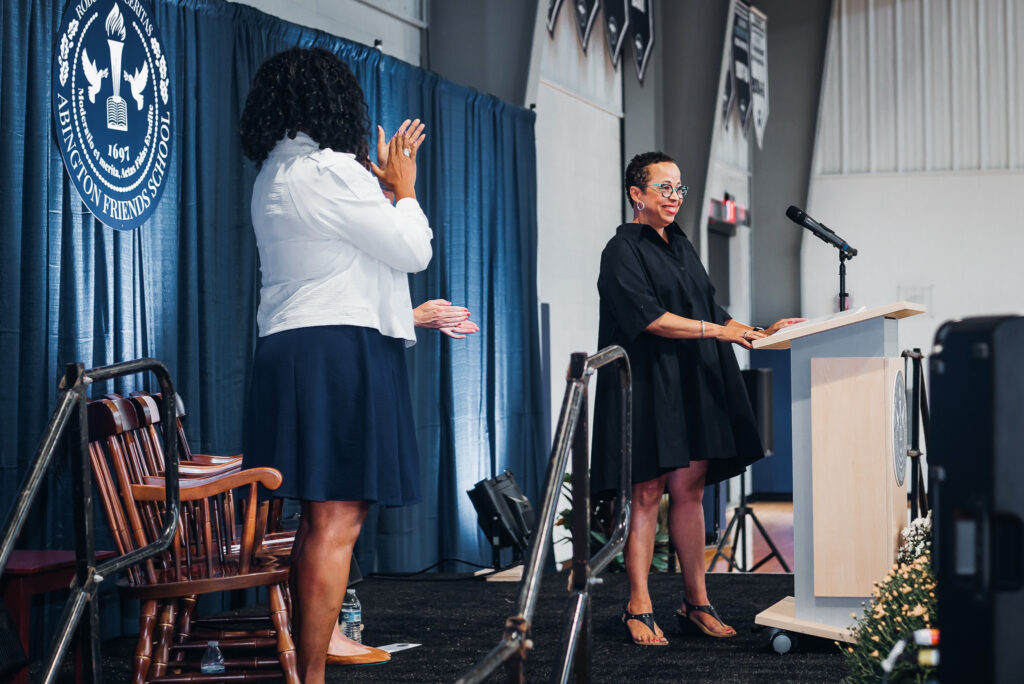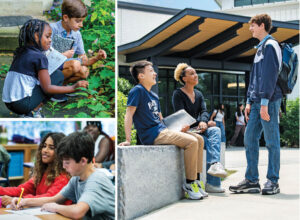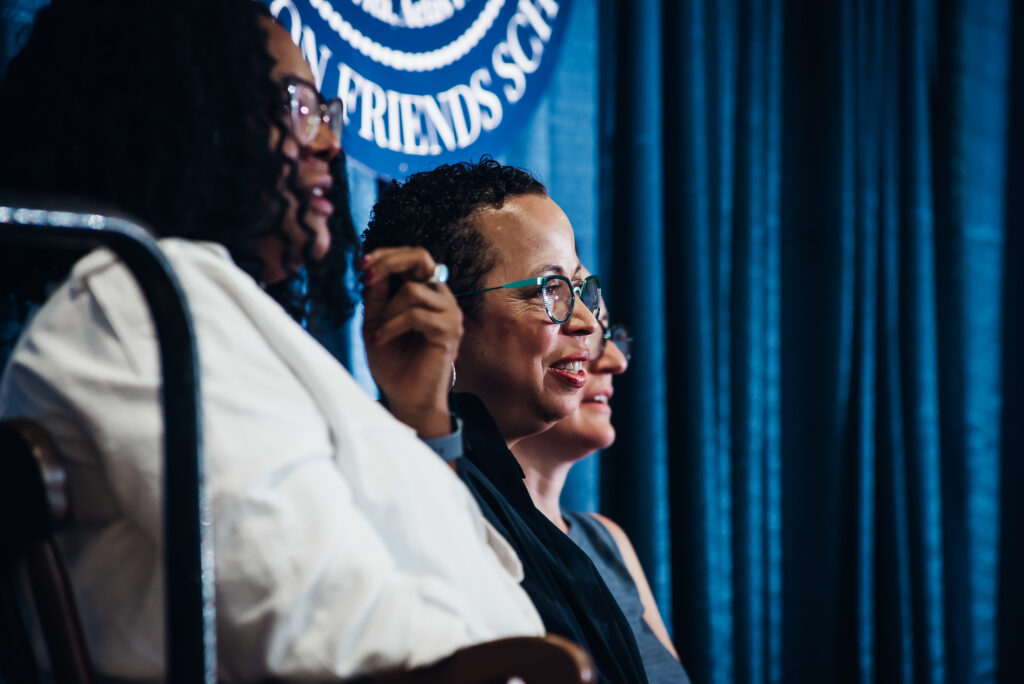
What does it mean to say that one’s education was transformational? Is it enough to say that a student has changed from the day of enrollment to their graduation? Or is there something deeper at work – a sense of belonging that transcends one’s physical and emotional evolution that gets to who one truly is in on a deeper, more real level. Dr. Nicole Hood thinks she has the answer, and it is the result of friendship, serendipity and storytelling.
On Friday, September 6, Abington Friends School invited the entire school community to a special Welcome and Convocation Ceremony for Head of School Nicole Hood, who joined the community on July 1, 2024. With more than seven hundred people gathered in attendance within the Berman Athletics Center, our Clerk of School Committee Becca Bubb opened the ceremony with a moment of silence, and our Chamber Singers performed a rendition of Because You Sang. Becca then invited Ayanna Hill Gill, President of ADVIS (Association of Delaware Valley Independent Schools), to the stage to introduce Nicole.
In her introduction, Ayanna emphasized Nicole’s strength, perseverance, and commitment to the often unseen work of learning. Throughout her comments, Ayanna made connections between Nicole’s tenure with Marge Piercy’s poem “To Be of Use”, which begins “The people I love the best / jump into work head first / without dallying the shallows / and swim off with sure strokes almost out of sight.”
“In choosing to lead Abington Friends School, you have chosen work that is real—work that matters deeply,” Ayanna remarked. “It is work that shapes the lives of young people, molds future generations, and honors the Quaker values of simplicity, peace, integrity, community, equality, and stewardship. Your educational philosophy resonates deeply with the vision of Abington Friends School, as you believe that cultivating the joy of learning is the highest and noblest purpose of education.”
Please find Dr. Nicole Hood’s remarks on the power of a transformational education during the Convocation below.
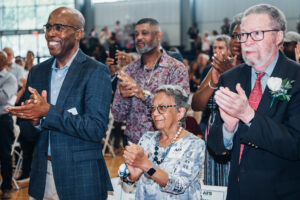
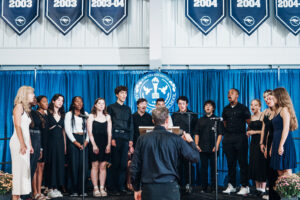
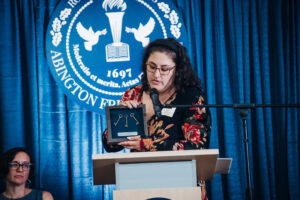
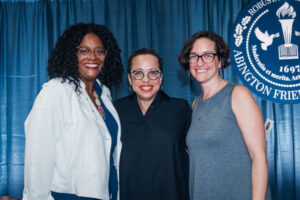
Dr. Nicole Hood’s Remarks to the Abington Friends School Community
Good afternoon, and welcome to Abington Friends School. I am absolutely filled with gratitude for this moment – one that I’ve thought about and envisioned for a very long time. The list of “thank yous” is long and inevitably incomplete because it truly does take a village to make a Head of School. First, thank you Becca, for your kind words and your unwavering support over the past year. I am grateful to you and to the AFS School Committee for your deep faith in my leadership and for this opportunity to serve as Head of School. Thank you to Ayanna Hill-Gill for those inspiring introductory remarks and for your friendship, which has been vitally important in my journey to school leadership. Thank you, Dr. Darryl Ford for your mentorship and support. I think you know that your cheerleading and wise counsel have made all the difference in my standing here today. Thank you to the school leaders and colleagues from across this region (and beyond) who are visiting us today, in particular those from the Bryn Mawr School in Baltimore. I’ve felt a powerful sense of community since I was announced as the incoming Head of School and know that I will rely on that community as I grow in my wisdom and experience. Thank you to the faculty, administration, and staff of Abington Friends School. I have felt your trust, welcome, and warmth in abundance since last fall and am proud, so incredibly proud, to work with you and to be inspired by you each day. A special and particular thank you to Rich Nourie, who is with us today. Your optimism and encouragement have bolstered my confidence throughout these transitional months and have made AFS the outstanding school it is today. And another special thank you to AFS Librarian Toni Vahlsing who helped immeasurably in the preparation of these remarks. Thank you to AFS students and families. Students, you are the reason for everything that we do here. I have observed your pride in this community, your diligent efforts to be your best selves, your kindness and empathy, your concern for the school and the world beyond it, and I am eager to witness your growth over the next year and beyond. Thank you to my friends and family, both those who are able to be here today and those who are cheering on from a distance. Truly every season of my life is represented by the people gathered here, and my sister-friends have shown up today to raise me up. I am especially grateful that both my parents, Bernard Gilpin and Ernestine Gilpin, are here. Their unending love and support undergird all of my accomplishments; they are my models of integrity and I could not be here without them. Finally, thank you to my husband, Kevin. Your support and encouragement have been everything. After all these years, there is no “you” or “me.” There’s just “us.” We did this.
Since last October, a lot has been made of my appointment as Head of School at AFS. Our school was founded in 1697, and I am the first woman to serve as Head of School in a non-interim capacity (and here I must acknowledge the service of Ann L. Ritz, who was “Acting Headmistress” from 1943 to 1946). Additionally, in 328 years, I am the first Black person in this role. There is a palpable pride in these facts about my identity when I encounter people in our very diverse school community. Even when I meet people from outside the AFS community who pay attention to school news, my identity as “the first” is frequently commented on, either explicitly or obliquely. When I was interviewed over the summer, a reporter from a local publication asked me about my thinking around being “the first.” I answered, honestly and without intending to dodge his question, that I wake up Black and a woman every morning and that I don’t tend to think much about how those facts impact the school day. But perhaps I was being unintentionally cheeky with him. And while I’m not blind to the reality that my appointment feels like a historic change for a school with a past as long as ours, my identity as a Black woman merely is part of a whole set of identities and experiences that resulted in my appointment.
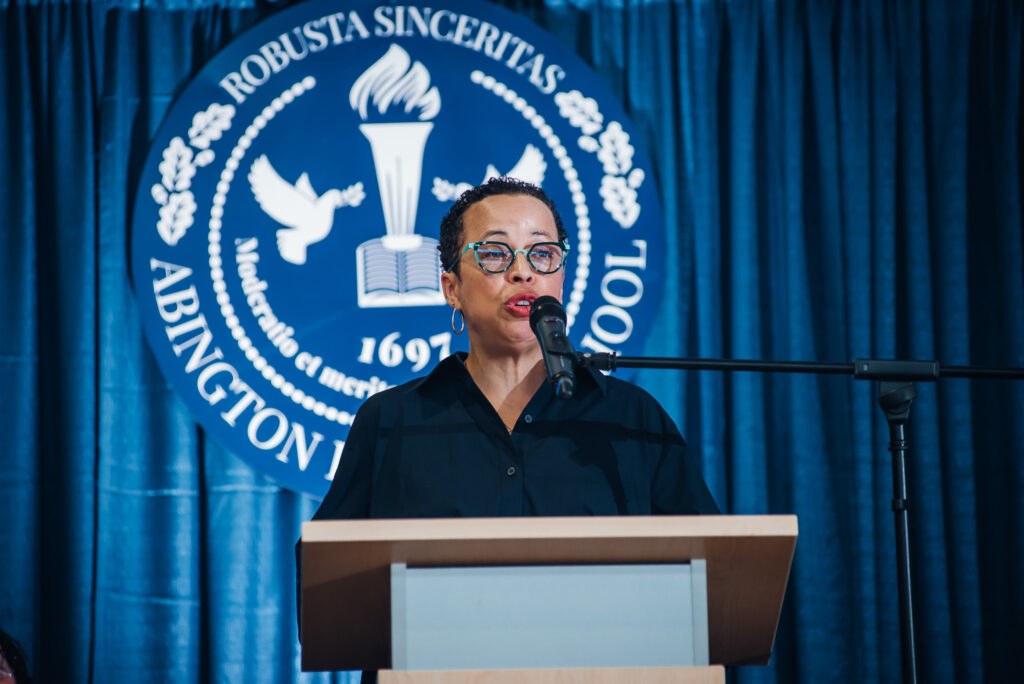 Still, from my earliest interactions with AFS, it has been clear to me that this is a school community prepared not only to appoint a different kind of leader (a sign of sort of progress in and of itself) but also to fully support and trust a different kind of school leader. That kind of institutional or cultural trust is difficult to discern and even harder to achieve. It requires commitment on the part of both those inside the institution who might be considered guardians of the school’s culture and the leader who represents that difference, that break with the past. I arrive here well-prepared for leadership, offering the necessary professional, spiritual, and life experiences to lead effectively, and with a tremendous desire to serve the school well. And still, my readiness is only half the story. The other half is the Abington Friends School story, the legacy of a school that has, over its long history, laid the groundwork for this installation today. In short, what may look like historic change is, in fact, evolution in a school that is grounded in Quaker values.
Still, from my earliest interactions with AFS, it has been clear to me that this is a school community prepared not only to appoint a different kind of leader (a sign of sort of progress in and of itself) but also to fully support and trust a different kind of school leader. That kind of institutional or cultural trust is difficult to discern and even harder to achieve. It requires commitment on the part of both those inside the institution who might be considered guardians of the school’s culture and the leader who represents that difference, that break with the past. I arrive here well-prepared for leadership, offering the necessary professional, spiritual, and life experiences to lead effectively, and with a tremendous desire to serve the school well. And still, my readiness is only half the story. The other half is the Abington Friends School story, the legacy of a school that has, over its long history, laid the groundwork for this installation today. In short, what may look like historic change is, in fact, evolution in a school that is grounded in Quaker values.
Those Friends school values comprise spirit-led commitments to inclusion, to equity, to integrity, to justice, to peace, to seeing “that of God” in everyone. They are about much more than the identity of any one school leader – but about an openness to seeing leadership potential in everyone. The Abington Friends School mission speaks explicitly to these foundational values. And, over the course of these 3+ centuries, ours is a school that has lived into those values, even when doing so may have presented risks to the institution, even when commitments to building and sustaining a just world came at a cost.
I’d like to tell you now about an AFS alum whose story speaks to those commitments to building a more just world. It’s a story that has inspired me. Beverly Floyd, was a student from Birmingham Alabama, who attended AFS from 1964 through her graduation in 1966. She received a full scholarship to attend AFS through the Southern Negro Student Project, a program sponsored by the American Friends Service Committee. For those of you unfamiliar with the AFSC, it is an organization founded in the early 20th century that still exists today, whose mission involves working toward a just, peaceful, and sustainable world free of violence, inequality, and oppression.. The Southern Student project that enabled Beverly Floyd to enroll at AFS ran for a relatively short time, between 1957 and 1968, and served no more than a dozen or so students annually even during its peak. The aim of the program was “to bring promising young people, thwarted by the doctrine of the separation of the races, the fullest development of their gifts,” while at the same time “providing northern whites with an experience which will increase our understanding and deepen our involvement with the human community.” I hope you noted, as I did, the absence of any reference to the inherent power inequity between the races in this description. This program was intended to foster deep learning for both the student and the broader community. The description of the AFSC Southern Student Project stands out for me because it eschews the noblesse-oblige tonality that is threaded through so much of the discourse around diversity and access programs in schools, even today.
Now back to Beverly Floyd. She arrived at AFS in the fall of 1964, and her arrival merited a story on the front page of “Oak Leaves” (at that time a publication “by and for the Home & School Association.”) The article includes a brief description of the Southern Student Program and says the following about Beverly, “she is a conscientious honor student, has held many class and school offices, is a pianist, a proficient seamstress, and person whom faculty cite as ‘receptive to and responsible toward the needs of others’…Beverly is living with the Daniel Conlon family, 606 Meetinghouse Road, Jenkintown. She comes as a new daughter to the Conlons whose own daughter, Rebecca, an alumna of Abington Friends School, is a senior at Earlham College. Beverly has four Conlon brothers: David, a June graduate of Penn Charter, who now attends Carleton College, Stephen, in seventh grade at Huntingdon Junior High; Mark, in fourth grade at Cedar Road; and Timothy (2nd) who accompanies Beverly to school each day at AFS.” Here again, I must point to the language in this article. It was 1964 and this is a school publication writing in explicitly familial terms about the relationship between a white family and a Black exchange student from Alabama.
Over the following two years, Beverly was highly successful at AFS academically and otherwise. She is pictured in another issue of Oak Leaves the next fall when another Southern Student Program student, Brenda Watts, arrived at AFS in the year behind her. She was also interviewed by a local news station producing a documentary as part of the class of 1966 Senior Project on “The Status of American Women.” Beverly lived with the Conlons both years and was very comfortable with the family, staying in touch long after she graduated. In both of her class photos, from her junior and senior years, she is the only Black student pictured. After graduating from AFS, Beverly went on to Fisk University, a prominent HBCU in Nashville. She then attended graduate school in Knoxville, TN, earning a master’s degree in social work. She married, becoming Mrs. Beverly Floyd Johnson and raised two sons, Juan and Mario, both of whom are quite successful in their own right. Mrs. Johnson spent her professional life as a central office administrator in the public schools in Clarkesville, Georgia. She continued to maintain contact with AFS, and has attended reunions into the 2000’s.
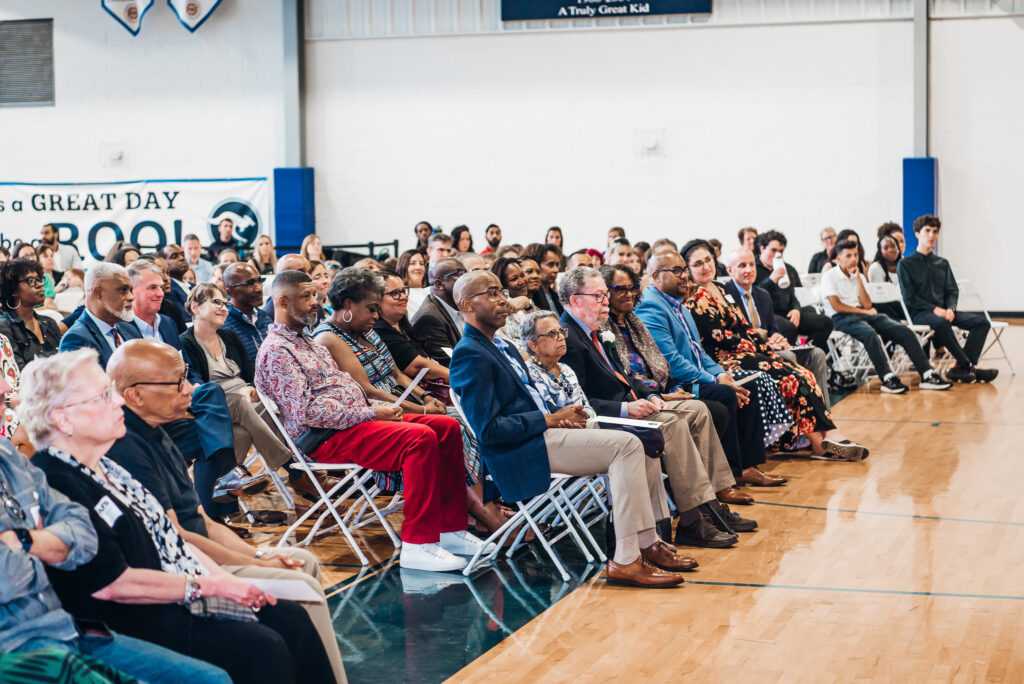
So by now, you’re probably wondering how it is that I came across Mrs. Johnson’s AFS story and why her particular story speaks to me. Last October, on the day that the school announced my appointment as incoming Head of School, I received a text message from a friend that I see far too seldom, mostly because she lives in Atlanta. Jean Harvey wrote the following to me, “Nicole! I just heard your news. I wanted to share that my mother-in-law was a student at Abington Friends. She enrolled right after the Birmingham bombing. She said it was transformational. She lived with a family nearby and kept in touch with the school. I believe she even went to a reunion in the past 10 years. She has such fond memories. I wanted to share that with you. Congratulations on your new role!” I wrote back to thank Jean for sharing the story with me and told her that I’d like to talk more. But mostly, I wanted to know her mother-in-law’s name. The response came quickly: Beverly Johnson; Beverly Lois Floyd when she’d been a student.
Jean also included a stunning additional detail. She shared that her mother-in-law’s family had been friends with several of the families of the four girls killed in the 16th Street Baptist Church bombing in 1963, and so her coming to AFS had been at least partially precipitated by that tragic event. I began thinking about the trauma of losing childhood friends to racial violence, of living under the often dehumanizing restrictions of Jim Crow, and deciding with your family, in that moment, to take advantage of a unique educational opportunity. I imagined the courage it took for Beverly to move here to Jenkintown, to attend school as the only Black student in her class, and to live with a family of white strangers, however kind they might be. But I also kept coming back to what Jean said first – that her Mother-In-Law had wonderful memories of her time at AFS, that it was transformational for her, and that she’d kept in contact.
A few days later, my mother and I were chatting on the phone when she told me a strangely similar story. A friend of ours, Karen Savage, had a sister who’d attended AFS in the aftermath of the Birmingham bombing. While Karen grew up in Birmingham, she has lived in my hometown of Richmond, Virginia for decades and is married to one of my mother’s childhood friends. Karen is an accomplished professor and master vocalist; one of the most musically gifted people I know. And yes, of course, Karen’s sister is Beverly Floyd Johnson. Since then, Karen and I have spoken at length about the circumstances that brought Beverly to AFS and how she felt about her time here. She told me about Beverly’s deep intellect and her reputation for asking endless questions (both before and after she attended AFS). Karen told me how kind the Conlons had been to Beverly, and how she really thought of them as family because they treated her that way. She told me that Beverly said that her first year at Fisk had been a breeze because of how well prepared she’d been for college after the two years spent here at AFS. Karen shared with me about a trip she herself took to visit her sister here in Jenkintown and about her own experience attending Meeting for Worship and performing weekend community service in a Philadelphia neighborhood during her visit. Karen still remembers the single person who spoke at Meeting for Worship and his reflection on the Lord’s Prayer as an “unselfish prayer” because it begins with the phrasing “Our Father.” In short, Karen reported that Beverly was happy here, was embraced here, and valued her time here. The experience was, as Jean first reported, transformative. Sadly, Mrs. Johnson’s health is in decline at this time and I do not foresee an opportunity to speak with her. But from Karen and from Jean, I got a sense of how joyful she was, the fullness of her life, and how much she appreciated both the education and the kindness that was extended to her as a student here.
The intersection of these two stories from two utterly unanticipated sources felt and still feels meaningful to me. Last fall, when I first learned about her, it was as if Mrs. Johnson was saying to me, “Pay attention! Learn all that you can about the special place that you’re going to lead!” I felt she was telling me that AFS is a school, an institution, a community, and people worthy of my best self, my best effort. That this was a place I could be at home in my own skin, a place that would value all that I bring to the table. And honestly, I needed that reassurance. I needed it then, and I need it now.
You see, I have arrived here as a stranger, one entrusted with the stewardship of this great school. And last fall, after the announcement, I needed a way to see a part of myself in this school’s tremendous legacy. I needed a way to connect to this centuries-long history in order to begin to think about how to advance us through this, our fourth century. And many of the identities that inform both your understanding of me, and my understanding of myself, as a woman, a Black person, a Southerner, a wife, a mother, a school-person, a friend. All of those are identities that I share with Mrs. Johnson. I’m also mindful of the reality that in 1966, AFS was still a girls’ school, and I come here a very proud girls’ school alumna and having spent much of my career in girls’ education. And just to pile on the coincidences, as a student at Fisk University, Mrs. Johnson pledged the same sorority that I would join decades later at the University of Virginia. So many of the sister-friends here today that I alluded to at the beginning of my remarks are also members of this sorority – as are Jean Harvey and Karen Savage. So if I needed to see myself in the legacy of this remarkable school community, Mrs. Johnson gave me that gift of recognition in abundance.
The circumstances of my arrival at AFS are so much more joy filled than the ones that Mrs. Johnson was managing. And you should all know that my days since I arrived at AFS have been uniformly joyful. But I am benefiting from the same caring community, from the same set of values and commitments that made her treasure her years as an AFS student. As a school, we often express justifiable pride in the diversity of our community – racially, ethnically, socio-economically, and otherwise. As I said at the beginning of this address, I can already feel the pride in my leadership. But Mrs. Johnson’s story reminds me that I stand on the shoulders of those Friends who came before me and who made this a place of learning, healing, justice, and peace. Viewed from that lens, this installation is one particular moment (significant or not) in what is now 328 years of courageous and historic moments. So today, I’m standing in front of you as head of school, and I do so with deep gratitude for Mrs. Beverly Floyd Johnson, class of 1966, who told me over the miles and across time that while I may be the first, I’m never alone.
